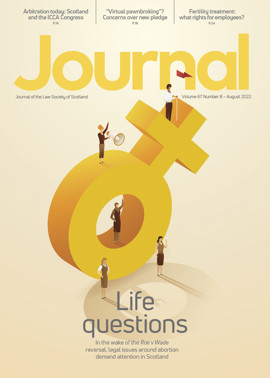Human rights: civil rights not engaged by legal aid bid
In Beggs v Scottish Legal Aid Board and Scottish Information Commissioner [2022] CSIH 24 (10 May 2022), Mr Beggs (“B”) reclaimed a Lord Ordinary’s refusal of a petition for judicial review of a Scottish Legal Aid Board (“SLAB”) decision to refuse an application for legal aid.
Background
B, a serving life prisoner convicted of murder in 2001, continued to maintain his innocence. He attempted to secure exculpatory information from Strathclyde Police by submitting freedom of information (“FOI”) requests. In 2011, the Scottish Information Commissioner determined that certain information requested was exempt from disclosure. The Inner House affirmed the Commissioner’s decision in January 2014.
In November 2015, SLAB refused B’s application for legal aid to appeal the Commissioner’s decision to the UK Supreme Court (“UKSC”). B sought judicial review of that decision, but a Lord Ordinary refused permission to proceed as no Wednesbury unreasonableness had been identified and there was no real prospect of B succeeding. A second application for legal aid was refused and again challenged; this went to a substantive hearing but the petition was again dismissed.
On 28 February 2018, B submitted a revised second FOI request to Police Scotland. By then he had lodged a third application for legal aid to pursue a challenge to the decision of the Extra Division in the UKSC. SLAB refused the legal aid application on 19 September 2018 as the second FOI request had yet to be determined, meaning B had not exhausted fully his legal remedies.
B petitioned for judicial review seeking (i) reduction of SLAB’s decision dated 19 September 2018, and (ii) declarator that SLAB’s refusal to grant legal aid for an appeal to the UKSC was unreasonable and unlawful at common law and under s 6 of the Human Rights Act 1998. It was submitted, inter alia, that SLAB’s decision breached B’s right of access to justice and his rights under s 6 of the Act. A proper assessment by SLAB would have confirmed the importance of the appeal to wider society as well as to B. The proposed appeal affected B’s civil rights, thus engaging his article 6 rights.
The Lord Ordinary held that SLAB’s decision was not irrational or unlawful. Furthermore, an application for legal aid did not engage a civil right under article 6. His opinion referred to Masson v Netherlands (1996) 22 EHRR 491, which held that “the grant to a public authority of such a measure of discretion indicates that no actual right is recognised in law” (para 51).
B challenged the decision. The grounds of appeal raised the issues:
- Does an application for civil legal aid engage a civil right in terms of article 6 ECHR?
- Does B represent the interests of wider society?
- Did the refusal to grant legal aid breach B’s right to a fair trial?
The decision
The Inner House determined that a legal aid application did not engage a civil right under article 6. B’s assertion was misconceived both under domestic legislation and ECHR jurisprudence. Article 6 presupposed a dispute directly decisive for a private right said on arguable grounds to be recognised by domestic law (Boulois v Luxembourg (2012) 55 EHRR 32, para 90).
Applying Masson, the wide discretion afforded to SLAB demonstrated that no actual right was enshrined or recognised in law. Even in cases concerning fundamental human rights, article 6 did not afford an unqualified right to obtain legal aid to pursue a claim as far as the litigant wished (NJDB v UK 2015 Fam LR 150 at para 74).
The court did, however, state that there could be circumstances where, notwithstanding the absence of an absolute right, SLAB’s refusal would be an unjustifiable interference with the right of access to the court (para 28).
On ground 2, it was held that B did not represent wider society. On ground 3, any post-conviction rights to recover information did not require the allocation of public funds for any proposed appeal to the UKSC, therefore the refusal did not breach B’s article 6 rights.
Commentary
This judgment reiterates the wide discretion afforded to SLAB in determining whether to grant civil legal aid. It reaffirms that the court has no jurisdiction to substitute its own views.
While it was unremarkable that the court agreed with the Lord Ordinary that an application for civil legal aid did not engage a civil right under ECHR article 6, what is of greater interest is the statement that there could be circumstances where notwithstanding the absence of an absolute right, SLAB’s refusal to grant legal aid could be an “unjustifiable interference” with the right of access to the court. It will be interesting to observe how this will be tested by applicants seeking civil legal aid in future.
Regulars
Perspectives
Features
Briefings
- Criminal court: Long road against addiction
- Family: CGT reforms in the pipeline
- Employment: Long COVID as a disability
- Human rights: civil rights not engaged by legal aid bid
- Pensions: A neverending story – fraud update
- Scottish Solicitors' Discipline Tribunal: August 2022
- Property: The RoS arrear: any light in the tunnel?
- In-house: As the workplace evolves






